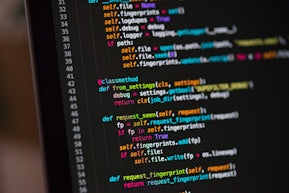This post has been written by Alex Bennett. Alex is a final year English student from the University of Nottingham and is currently part of a 10-week placement with Impression.
The prospect of learning to code can be daunting. There are loads of different languages that all do different things in different ways, and the whole thing can seem complicated and overwhelming. When I first encountered coding, I wrote it off as something I could never even begin to understand. There was so much jargon, and I didn’t know my <ol> from my <ul>. I’ve always been more right brain than left brain, and thought that coding just wasn’t for me. However, coding is a great skill to have in a world that’s becoming more and more reliant on technology. It’s also great to stretch your brain by learning new things, and I think pushing yourself academically is always a great thing to do.
Why is coding important?

As a final year student preparing to graduate in the summer, I think it’s so important to make sure you’re as skilled as you can possibly be before you begin to look for a job. Alongside studying, I think it’s useful to branch out and learn other skills like networking, communication and more industry-specific skills.
Coding is one of these skills, and learning HTML means you have applicable, useful skills that can be applied to a variety of jobs. Alongside the importance of skills acquisition and testing your academic limits, it’s so rewarding to see code that you’ve written appear as a fully formed website. Once you’re invested in the process, the whole thing is so much fun and it feels great to achieve things you thought you never could.
What is coding used for?
Within digital marketing, HTML allows you to tell the browser how to define and display content. Coding can also help in finding and editing meta descriptions, title tags and keywords. HTML is used by Google, Facebook and Wikipedia, so is a handy one to know if you plan on building or editing a website.
Where do I start with coding?
I began my journey to learning HTML with Codecademy, which makes it so easy to learn code in an easy and manageable way. Using simple, accessible tools and fun mini tasks, you learn code without even realising it. Instead of being faced with the entire coding languages, the process is split up into smaller chunks that allow you to go at your own pace. The jargon is broken down and explained coherently, and you can go back and recap anything you don’t fully understand at any point.
I didn’t feel overwhelmed at all, and the sense of achievement after every mini task spurs you on to keep learning. Before I knew it, I knew how to build and edit a webpage – all within a few hours. I could input photos and videos, edit text and create tables, and it was all so much easier than I was expecting it to be. Also, because it’s online, you can fit it around your daily life without having to physically attend classes or break the bank with tuition fees.
Which coding language should I learn?
Codecademy offer loads of coding languages, so you can learn multiple different ones if you’re feeling up for a challenge – plus, the majority of the resources are free. Some of these include HTML, Python and Javascript, which are some of the more popular ones, alongside lesser-known languages like SQL or Bash/Shell. It’s great to have such a variety of languages because they all serve different functions – your choice of language will be dependent on your requirements for the code you want to create.
Why should I use Codecademy?
The split-screen format of Codecademy is really helpful, as it allows you to see the changes your code is making to the website in real-time. The community forum allows you to ask questions (even the ‘stupid’ ones) and get tips and advice from other members of the coding community.
Can anyone learn to code?
Yes! The main thing I got out of Codecademy was that coding is for everyone, not just people with maths brains who already know everything about tech. Coding is useful for small business owners, anyone working in a professional industry, and ultimately anyone that is seeking a way to expand both their knowledge and their skills. You don’t need to be a tech genius to learn to code, you just need a thirst for knowledge, a bit of patience and a willingness to learn.
Get in touch to discuss the technical SEO opportunity of your business and website today.



